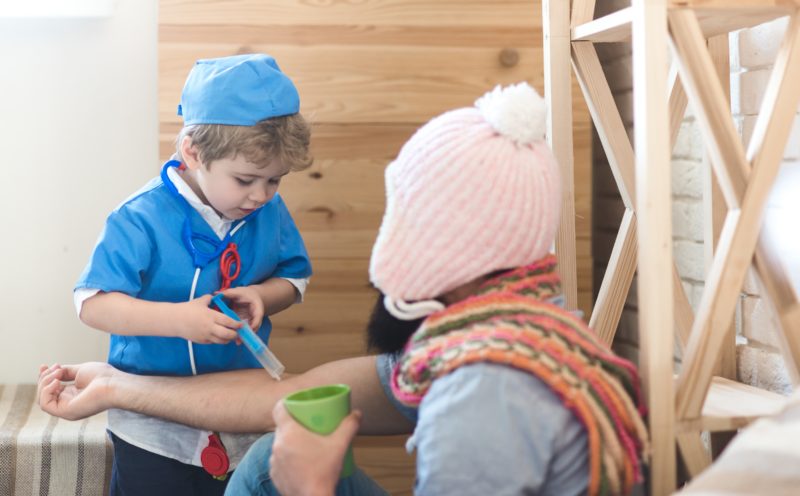When you hear the word ‘play’, you think of happiness, fun and enjoyment. You also may think that all kids must know how to play and how hard can it be? In reality, play is very complex and some kids find it very difficult to enjoy! There are many forms of play, including pretend play. Pretend play starts to evolve from 11 months to 18th months, which develops as they grow. Pretend play can be playing shopping, tea-parties, playing with teddies, catching a plane, and much more!
How is pretend play beneficial for your child?
There is a lot of research that shows that pretend play helps your children develop their problem solving, sequencing of ideas and social skills. Pretend play allows your child to explore their problem-solving skills. For example, deciding which role to play or how to compromise when using different materials when building a house with their peers.
As play develops, your child will learn to sequence their play. For example, learning to create the food, put the food on plates and feed the dolls. Learning how to follow steps in a logical sequence can help your child understand the process for other activities, including getting ready for bed!
Pretend play allows children to believe that it is real, creating their own situation. This extends from what is literally happening in play. Objects become alive in play, they can use a doll or figurine, talk to them and feed them dinner. Additionally, your child will also explore different characters. They can dress up as a doctor and fix their teddies or become a policeman for the day and make sure the baddies go to jail!
Play and social skills are very important to one another, children learn to communicate through play, for example, including each other to build a castle or drive trucks through the sand. Your child starts to explore different roles, learning how to take turns and start to understand their peer’s feelings. If your child is struggling to understand play, they may start to become overwhelmed in environments surrounded by their peers and their play, impacting their emotional regulation.
Karen Stagnitti, who is a play expert, has developed a wonderful program called Learn to Play which occupational therapists can use to help children with Autism Spectrum Disorders, Down syndrome and neurological conditions develop their play.
Karen Stagnitti breaks down the main areas of pretend play, which includes:
- Play scripts
- Sequences of play action
- Object substitution
- Social interaction
- Role Play
- Doll and teddy play
There are a lot of different signs that can show your child may be having difficulty playing. Does your child wreck their siblings or peers play? This can highlight their difficulty in understanding the play surrounding them. As your child develops they learn to substitute items to use in play, which start off very simple including a block for a phone, to using an object completely different to the play! Another sign your child may be having difficulty in play is if your child is having trouble using objects around the house, which could include using pillows for a mountain!
Pretend play is the start of your child’s storytelling, which then evolves into their ability to develop narratives in school. Often children with difficulties with pretend play, repeat play and are unable to create a storyline. You may observe your child becoming stuck in their play, repeating actions and unable to extend their play. Your child may have great difficulty initiating their own play, looking for others to help them start exploring their play.
If your child is showing signs of having difficulty with play, there are many ways you can help! Try and get involved in their play, adding to their play and joining in allows you to model different types of play. As you play with your child, you are modelling how to engage in play, helping them to develop their play skills.
A few toys and activities you can try with your child include:
- Cooking and food toys – pretend to cook for a tea party or going to the shops
- Large trucks and blocks – Create a roadway for trucks and build a house. You could add their figurines to live in the house to extend the play.
- Doctors kit – allow your child to immerse in play and become a doctor or vet to their toys.
- City mat – having a mat with a range of different places, including a fire station, shops and hospital can help your child explore play. Add in small figurines or transport items to add to the play.
- Cardboard boxes – create a truck, car or house!
- Old clothes and telephones – they may practice dressing up like you!
If you have concerns about your child’s ability to play, give us a call on 02 9913 3823 to see how we can assist.
Reference: https://www.learntoplayevents.com



